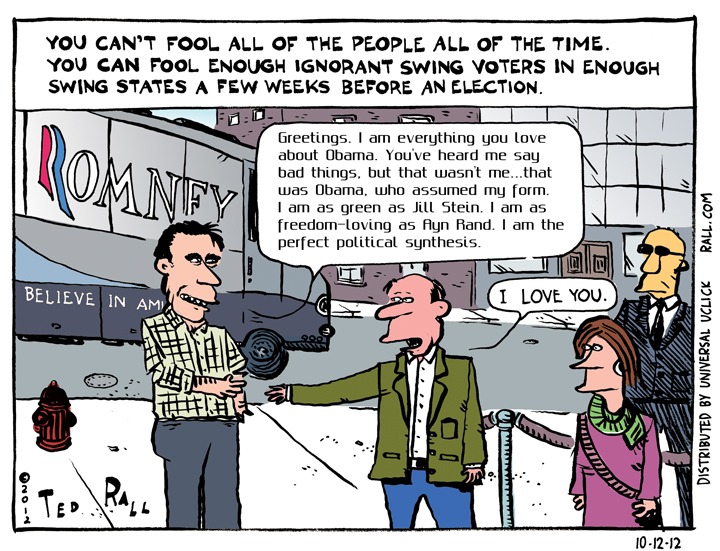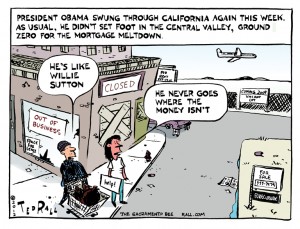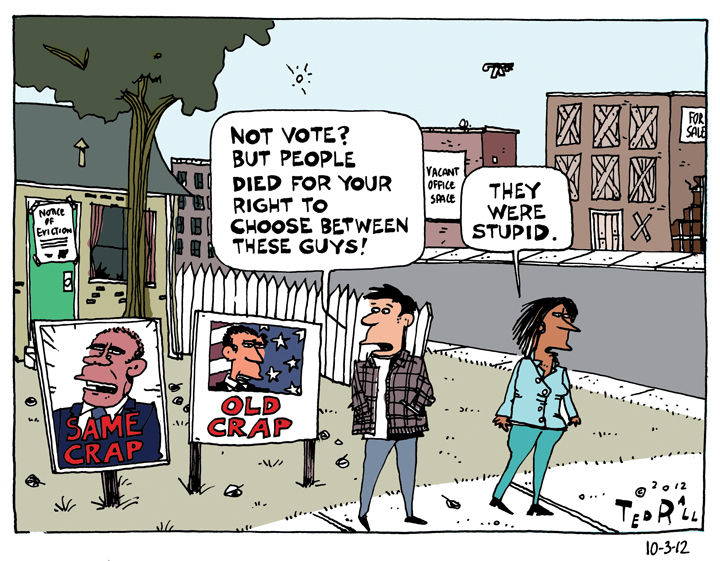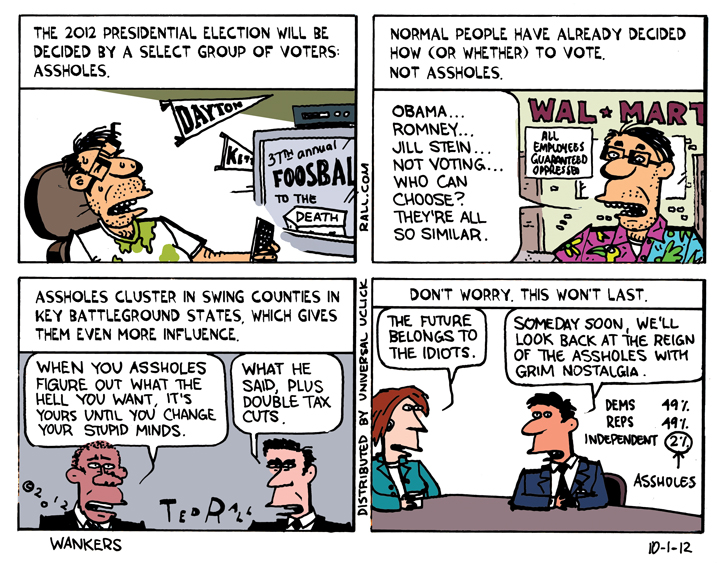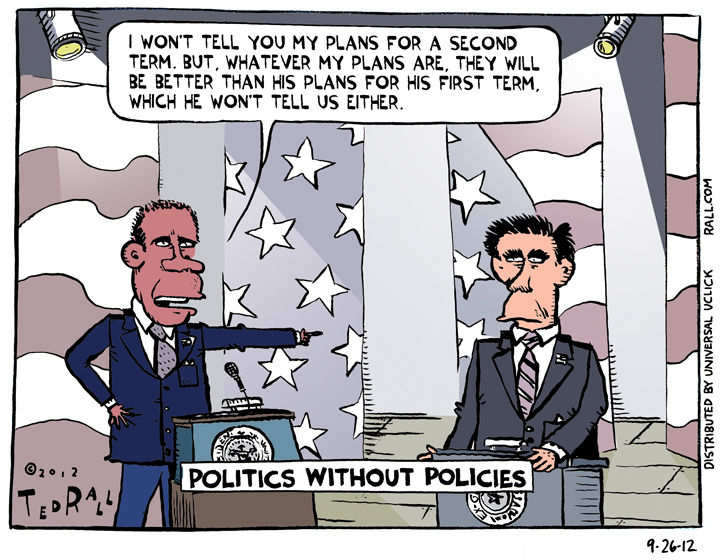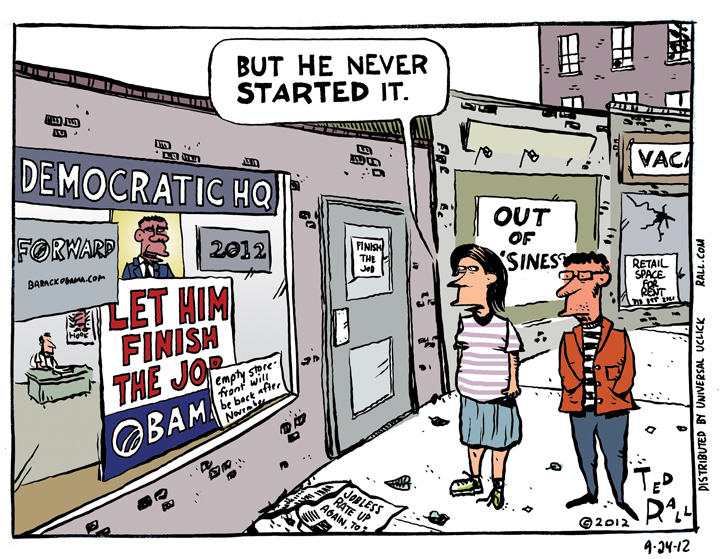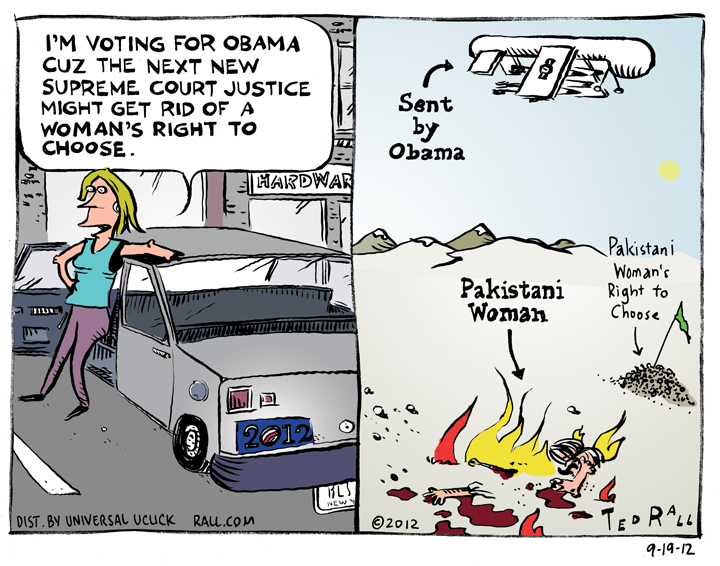Mitt Romney backs away from all the right-wing positions he espoused earlier in the campaign, especially during the Republican primaries, unveiling the kinder, gentler, Obama Lite version at the first presidential debate.
SYNDICATED COLUMN: Big Bird is a 1%er
Romney’s Silly But Salient Point on PBS
“I like PBS. I love Big Bird. Actually, I like you, too,” Mitt Romney told Jim Lehrer in the most quoted line from the first presidential debate. “But I’m not going to keep on spending money on things to borrow money from China to pay for.”
Huge news!
If deficit spending will be verboten under the Mittocracy, what will happen to all those out-of-work soldiers and defense contractors? Where will the drones crash after they run out of gas?
But let’s not talk about that either. Apparently I’m the only person in America who noticed that the military-industrial complex is about to go out of business.
People are instead focusing on Romney’s call to cut the $445 million a year the federal government–which amounts to a paltry 1.2% of 1% of the federal budget–contributes to the Corporation for Public Broadcasting, which subsidizes PBS and NPR.
My fellow political cartoonists are having a field day, echoing President Obama’s hat tip to the O.J. case: “Elmo has been seen in a white Suburban. He’s driving for the border.” The New York Times’ Charles M. Blow riffed: “Big Bird is the man. He’s eight feet tall. He can sing and roller skate and ride a unicycle and dance. Can you do that, Mr. Romney?” A co-creator of “Sesame Street” dismissed Romney as “silly.”
Silly? Definitely.
But is Romney right? Probably.
Candidates and parties aren’t important. Ideas are. If we’re ideologically consistent, if we want to appear credible when we criticize right-wingers like Romney, we left-of-center types have to hold ourselves to the same (or higher) standards as those to which we subject our enemies. We have to admit when they’re correct, even–especially–when it’s about something as trivial as this.
This is a time when we have to give the devil his due.
Until recently I was unaware of the exorbitant salaries received by executives and top employees of federally-subsidized broadcasting networks. In a 2011 op-ed for The Wall Street Journal, Senator Jim DeMint (R-SC) pointed out that PBS paid its president, Paula Kerger, over $600,000 a year–more than the President of the United States. “Kevin Klose, president emeritus of NPR…received more than $1.2 million in compensation, according to the tax forms the nonprofit filed in 2009,” wrote DeMint. “Sesame Workshop President and CEO Gary Knell received $956,513 in compensation in 2008.” (Now Knell runs NPR, which pays him about $575,000.)
Actor Carroll Spinney, who plays Big Bird and Oscar the Grouch, was paid more than $314,000 last year.
The liberal Center for American Progress countered: “While those numbers are not exactly chump change, it’s pennies compared to the salaries of another industry the U.S. taxpayers subsidize at much higher cost–Big Oil.”
But that’s red-herring sophistry.
Wasteful federal spending on overpaid executives is wrong, whether it’s for planet-murdering energy corporations, or on a network that airs free educational TV that helps ready kids for school with basics like counting, math and even Spanish.
Kill both.
“Like for-profit media companies, Sesame [and PBS] needs to pay top dollar to attract talent,” MSN’s Jonathan Berr argues, sounding like a Fortune 500 corporation defending sky-high CEO paychecks.
I disagree.
NPR and PBS do an OK job reporting the news–as long as it happens on a weekday–but that’s not the point.
If you accept public money, you’re in public service and should get paid accordingly. Which is to say, fairly–and at the lowest fair cost to taxpayers.
If you can’t find someone qualified to run NPR or PBS, or an actor up to the task of playing Big Bird, for $100,000 a year–especially in this job market–you’re not looking hard enough. Something is off-kilter when the studios of publicly-funded shows like NPR’s “All Things Considered” are centrally located and sumptuously furnished with mahogany tables and the latest high-tech gadgetry, while those of privately-owned 50,000-watt talk-radio powerhouses are situated in the slums and look like 1970s-era flophouses.
Salary figures for NPR “stars” like Robert Siegel ($341,992), Renee Montagne ($328,309), Steve Inskeep ($320,950), Scott Simon ($311,958) and Michele Norris ($279,909) are three to four times more than top-rated talk-radio hosts in the biggest markets get. How dare these 1%ers shake us down during pledge drives, much less collect federal taxdollars?
PBS only receives 15% of its funding from the feds. For NPR it’s 2%. As a former NPR exec confided, given the political heat they take over it, they’d might be better off cutting the strings. Then they’d be free to stop giving lying conservatives “equal time” to seem “fair.”
Why is the government giving broadcasters money they don’t need? There’s a much stronger argument for propping up newspapers, which remain the original source of 95% of news stories. Print media is in big trouble: the newspaper industry has shrunk 43% since 2000. Analysts say that even that chart-filled ubiquitous denizen of hotels USA Today may fold. If the feds want to do something good for journalism–and the well-informed populace required for vibrant democracy–they should start by subsidizing print newspapers.
But only if their editors and publishers don’t get paid ridiculous salaries.
(Ted Rall‘s new book is “The Book of Obama: How We Went From Hope and Change to the Age of Revolt.” His website is tedrall.com. This column originally appeared at MSNBC’s Lean Forward blog.)
COPYRIGHT 2012 TED RALL
SYNDICATED COLUMN: Finding Privatizer Ryan
If Romney Loses, Blame His Running Mate
Unless something surprising and dramatic happens, Obama will win the election. Earlier this week the Associated Press released an analysis of public and private polls that put “within reach of the 270 electoral votes needed to win a second term.” Obama is running ahead in many major swing states, including Ohio—a necessity for a GOP candidate to win. Yeah, yeah, this week’s presidential debates could make a difference—but they rarely do.
What went wrong with the Romney campaign? (Insert the usual fat-lady-not-over-blah-blah-anything-could-happen disclaimer here.)
All things being equal, this should have been a cakewalk for Romney—or any half-decent Republican. The economy is still awful. The official unemployment rate is over 8%, a magic number that historically kills reelection campaigns. Since Obama hasn’t promised any big jobs programs, neither Hope nor Change is on offer. And Romney has/had a sales pitch tailored for hard times: he turned around companies; his business experience will/would help him turn around the U.S. economy.
This election is/was Romney’s to lose—and apparently he has. The cause can be summed up in two words: Paul Ryan.
Sure, there were plenty of other missteps. His bizarre “47%” remark turned out to be a game changer that alienated swing voters. Like the (unfair) story about how George H.W. Bush was so out of touch that he’d never seen a supermarket price scanner (no wonder that preppy pipsqueak didn’t care about Americans who’d lost jobs under the 1987-1992 recession), Romney’s 47% slag fit neatly with our overall impression that Romney is a heartless automaton of a CEO who doesn’t feel our pain. Worse, he’s a man with something to hide; his refusal to release his taxes proves it.
Though greeted by Very Serious pundits as a canny combination of intellectual heft and Tea Party cred, the selection of running mate Paul Ryan has been a bigger disaster than Sarah Palin in 2008. (To be fair to John Cain, Palin was a Hail Mary pass by a campaign that was way behind.) As Paul Krugman pointed out in the New York Times, the selection is beginning to shape up as a “referendum” on the legacy of the New Deal and the Great Society, on Social Security, Medicare and, yes, Obamacare, which represents an extension of that legacy.”
Which is Ryan’s fault.
Before the veep announcement, the campaign was a referendum on Obama’s stewardship over the economy. Which was good for Romney. Since August it has been about Paul Ryan, known for his plan to trash reform entitlement programs. Misfire! The one time you don’t attack the safety net is when people are feeling squeezed and pessimistic about the future.
Sensing resistance, Republicans walked back Ryan’s extreme agenda using the classic “divide and conquer” approach, guaranteeing that people over 55 would keep their Medicare and Social Security. No sale. Romney-Ryan forgot something: senior citizens have children and grandchildren. Older Americans want younger people to enjoy the same benefits they’re getting now. Many senior citizens no doubt see the slippery slope of austerity: taking away Social Security for people under 55 next leads to going after those over 55. Finally, with the U.S. Treasury squandering trillions of dollars on wars, it’s hard to argue that the sick and old ought to resort to Dumpster-diving.
The Romney–Ryan campaign understood that voters were pissed at Obama. But they didn’t understand why.
There were two types of anger against Obama. Mostly prompted by Obamacare, right-wingers hate the president for growing an intrusive federal government. But there is also liberal resentment—shared by many moderates—at Obama’s refusal to help the jobless and foreclosure victims. Lefties also dislike Obamacare—but because, minus a public option, it’s a sellout to the insurance conglomerates. Romney could have seduced these voters with his own plans to help the sick and poor. Instead, he went with Ryan—who would destroy programs that are already too weak—and frightened disgruntled Democrats back into Obama’s camp.
Romney ignored the time-tested tactic of moving to the center after winning your party’s nomination. Romney repackaged himself as a right-winger to win the GOP nomination. In the general election, he needed to appeal to Democrats and swing voters. Choosing Paul Ryan sent the opposite signal.
This is not to say that President Obama will have an easy second term. Unlike 2008, when the vast majority of Americans felt satisfied that they had made the right choice, Obama is only likeable enough (the words he used to describe Hillary Clinton) compared to Romney. The only reason Obama seems headed to victory this November is that he was lucky enough to run against one of the most staggeringly inept campaigns in memory, headed by an unbelievably tone-deaf plutocrat.
(Ted Rall‘s new book is “The Book of Obama: How We Went From Hope and Change to the Age of Revolt.” His website is tedrall.com. This column originally appeared at NBCNews.com’s Lean Forward blog.)
COPYRIGHT 2012 TED RALL
SYNDICATED COLUMN: Is America’s Decline Inevitable?
This November: The Pessimist vs. the Cynical Pessimist
This week, decline is on my brain. Specifically, the decline of America.
“There’s not a country on Earth that wouldn’t gladly trade places with the United States of America,” President Obama says, denying Republican assertions that the U.S. is in decline.
(I don’t know about that. Would sick people in the 36 nations that have better healthcare systems than the U.S. want to switch places?)
Clearly we believe our country is in decline—polls show that Americans think that the next generation will live worse than we do. Pessimism about the future is reflected in a 2011 survey in which 57 percent of the public identified the U.S. as the world’s most powerful nation, but just 19 percent thought that we’ll still be #1 20 years from now.
Now The New York Times reports that life expectancy for white people without a high-school degree fell precipitously between 1990 and 2007. It’s shocking news. “We’re used to looking at groups and complaining that their mortality rates haven’t improved fast enough, but to actually go backward is deeply troubling,” the newspaper quoted John G. Haaga, head of the Population and Social Processes Branch of the National Institute on Aging.
“The five-year decline for white women rivals the catastrophic seven-year drop for Russian men in the years after the collapse of the Soviet Union, said Michael Marmot, director of the Institute of Health Equity in London,” reports The Times.
Bear in mind, the study includes the Clinton boom of the 1990s. And it doesn’t include the period after 2007, when the global fiscal crisis set off the current depression. It’s almost certainly worse now.
Even the two major presidential candidates seem to think that the U.S. doesn’t have much of a future. During his “60 Minutes” interview on Sunday, President Obama was asked what his big idea was for his next term. Interviewer Steve Kroft mentioned the Marshall Plan and sending a man to the moon as examples of big ideas.
Obama ducked.
“I think there’s no bigger purpose right now than making sure that if people work hard in this country, they can get ahead,” replied Obama. “That’s the central American idea. That’s how we sent a man to the moon. Because there was an economy that worked for everybody and that allowed us to do that. I think what Americans properly are focused on right now are just the bread-and-butter basics of making sure our economy works for working people.” A nonsensical answer. Yes, we should strive to get back to the lower gap between rich and poor that existed during the 1960s—but lower income inequality didn’t create the space program.
All Obama has to offer is a vague desire to restore the American Dream. Sorry, Mr. President, but getting back something we used to take for granted is the opposite of a big idea.
Though depressing, Obama’s pessimism is dwarfed by Mitt Romney’s.
Romney’s 2011 tax returns reveal that not only did he bet against the value of the American dollar—a staggeringly unpatriotic move for a presidential candidate—he received a quarter of his income from investments in other countries.
Romney, putting his money where his mouth isn’t, is literally betting his millions that the U.S. economy will head south. That the dollar will lose value. That foreign equities will outperform U.S. stocks. He even bought shares in the Chinese state oil company, which has contracts with Iran
He’s worse than a hypocrite. He’s an economic traitor.
Whether better, worse, or the same as today, the U.S. has a future. Who will lead us into that future? The person or movement that can credibly articulate a positive vision of a United States that doesn’t stand still, but actually moves forward–you know, like Obama’s campaign slogan. But who and where are they?
This presidential campaign is shaping up as a race between a pessimist and a cynical pessimist, and in such a contest the mere pessimist is likely to win. But it isn’t good for us in the long run.
“Never have American voters reelected a president whose work they disapprove of as much as Barack Obama’s,” observes the Associated Press’ Bill Barrow. “Not that Mitt Romney can take much comfort—they’ve never elected a challenger they view so negatively, either.”
Obama has the edge in the polls, partly because he presents a less somber vision despite his lack of big ideas. (It helps that Romney is a terrible politician.)
“This is America. We still have the best workers in the world and the best entrepreneurs in the world. We’ve got the best scientists and the best researchers. We’ve got the best colleges and the best universities,” said the President in his “not in decline” remarks. (Never mind that there’s no point going into debt to attend school if there aren’t any jobs when you graduate.)
Well, the United States IS rich. Staggeringly so. The problem is that our wealth has become so unevenly distributed that there is no longer enough consumer demand to support the population. It’s a like a marriage in which both spouses can make it work—if they change their attitudes. If we began focusing on the problems of poverty, unemployment and underemployment, as well as rising income and wealth inequality—i.e., economic injustice—and then fix them—we’ll be OK.
I don’t think we’ll be OK.
The U.S. doesn’t have to be in decline. Some liberal elites, like Fed chairman Ben Bernanke and investor Warren Buffett, understand the need to redistribute wealth. They’re one side of a split in the ruling classes. Unfortunately for the system and for many Americans, they’re losing the argument to greedpigs like Romney.
(Ted Rall‘s new book is “The Book of Obama: How We Went From Hope and Change to the Age of Revolt.” His website is tedrall.com. This column originally appeared at NBCNews.com’s Lean Forward blog.)
COPYRIGHT 2012 TED RALL
Politics Without Policies
For the first time in memory, both major candidates for president of the United States are heading into the home stretch of a campaign without having campaigned for concrete policy proposals. We literally have no idea what either of them would do if elected. All we know is their tone and public personnas.

